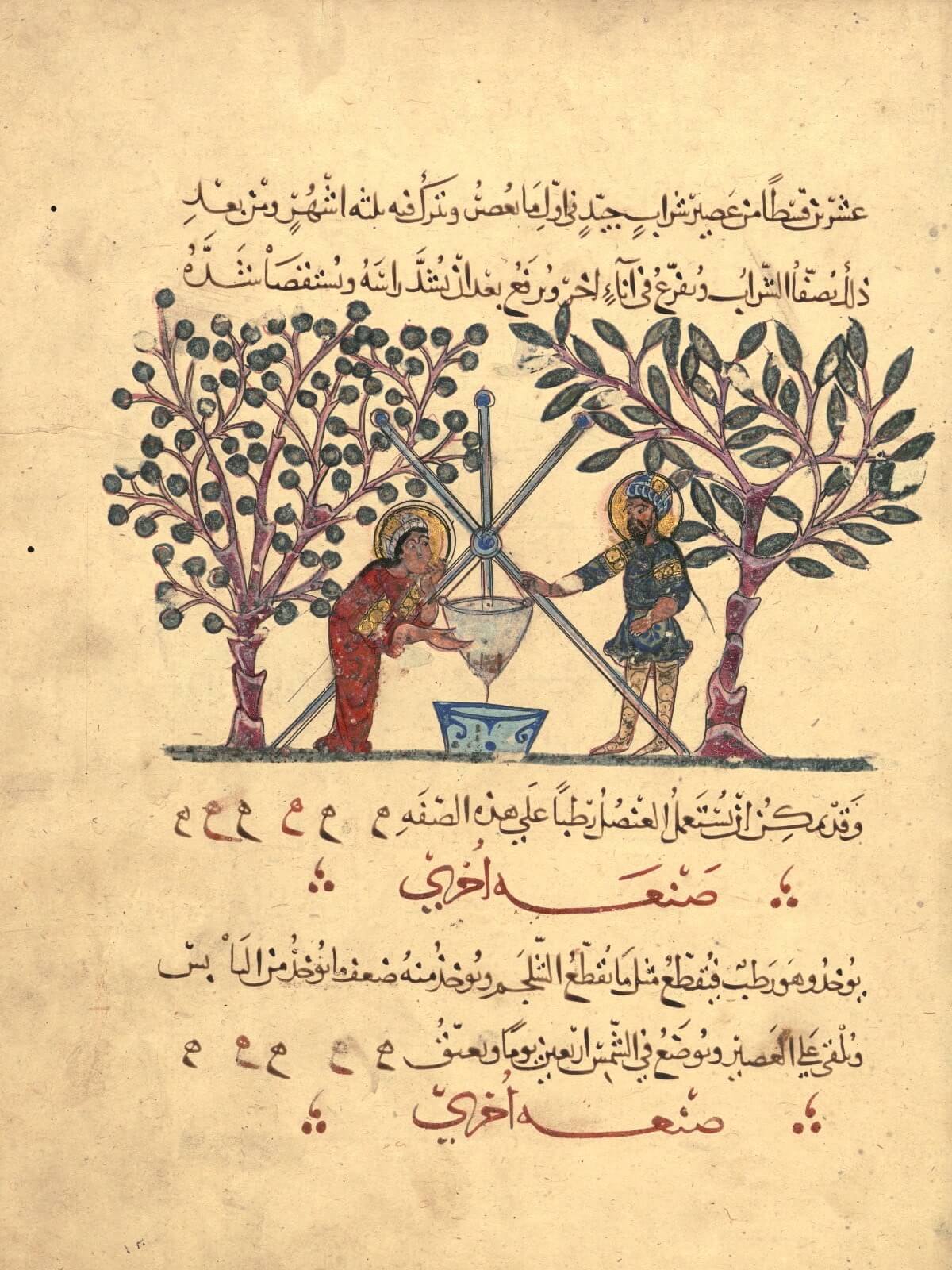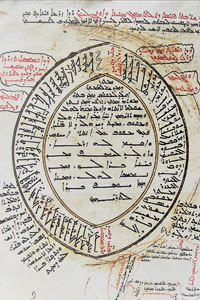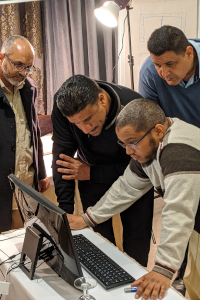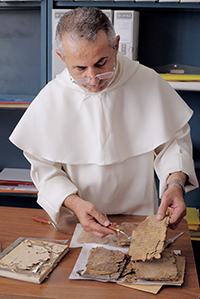
Not a Friend of ASOR yet? Sign up here to receive ANE Today in your inbox weekly!

July 2023
Vol. 11, No. 7
Digitizing Manuscripts from Southwest Asia: Access, Ethics, and Sustainability
By Raha Rafii
The expansion of digital humanities in the last decade has led to a widespread increase in manuscript digitization projects by libraries, universities, and other organizations. Lauded as a valuable process that democratizes access to manuscripts and even preserves endangered ones, digitization will undoubtedly receive more funding and support. However, the positive support for digital humanities projects necessitates a critical eye to their role in academic research as well as their impact on origin communities whose materials are digitized. Do digitized manuscripts actually increase access for all potential users? Does digital access ignore questions about the politics behind access to the manuscripts in the first place? More broadly, is digitization as permanent and sustainable as people assume?

Single leaf from the Arabic version of Dioscorides’ De materia medica, copied in 621 AH / 1224 CE in Baghdad and removed from the original manuscript – Aya Sofya 3703 – probably in the late 19th or early 20th century. Around 30 illustrations were removed from this manuscript that are now in public and private collections. Walters Art Museum.
To answer these questions, I will draw on examples from the projects I am most familiar with: digitization of premodern Arabic-language manuscripts led by university-based researchers, which also tend to overlap with “heritage preservation” goals. The focus of these projects not only affects the process of digitization itself (as determined by academic research priorities and funding) but also the dynamics between outsider researchers and the origin communities who claim and take care of the manuscripts, including in war and conflict areas where looting and other forms of destruction are ongoing.
The discussion of origin communities and their role in digitization projects necessitates an understanding of the wider contexts of questions of “guardianship” and calls for repatriation within museum spaces. Such discussions include questions of consent by the origin community on two levels: 1) if the institution has ownership of the object to be digitized, did it have consent to own the object in the first place? And 2) whether an institution owns an object or not, does it have consent to digitize the object for a much wider, public audience? While these two issues may appear to overlap, they are actually two separate ethical concerns.
The second question refers to the role of digitization as a transformation of an object that shifts the significance of, access to, and audience for the object, which should acknowledge the role of origin communities. An example of this approach is the acknowledgment of manuscripts as objects rather than merely as texts to be read (the philological approach). Approaching manuscripts as objects creates awareness of not only the physical parts of the manuscript that digitization projects tend to neglect, but also the relationship of the manuscripts to objects found in, on, or near the manuscripts. Such objects are crucial to understanding provenance, networks, and community uses, as evidenced by the insightful series of video lectures by The University of Toronto Textile Workshop. More importantly, approaching manuscripts as objects is more cognizant and respectful of community use. Philological approaches to digitizing manuscripts tend to disaggregate library, archive, communal, or personal collections as digitized objects as well as in cataloging, so physical forms of grouping or using manuscripts together get lost in the digitization process.
In addition to consent to digitization from origin communities, there are other ethical issues regarding digital access, such as whether the origin communities themselves have access to the digitized objects. Here we get into the uneven political dynamics between militarily powerful and economically privileged states and under-resourced countries, often contrasted as the “Global North” and the “Global South.” One example is U.S. military trafficking of documents from post-2003 invasion Iraq to the U.S., which resulted in the removal of physical access for Iraqi researchers, scholars, and other groups, and thus their rights to use the documents to tell their own history and narrative. In that instance, the U.S. military not only selectively digitized the documents to create its own war narrative, but restricted access to the website repositories hosting them. Furthermore, some U.S. government agencies then deliberately removed or passively cut off access to the websites as a result of a lack of funding, thus wiping out any access—physical or digital—for Iraqis.
A further issue is whether digitized manuscripts can be equitably catalogued so that origin communities can search for their digitized forms online. A good example is the Yemeni Manuscript Digitization Initiative, which is a cultural preservation heritage project organized by the University of Oregon, Princeton University, and the Freie Universität, Berlin that works closely with the Zaydi community in Yemen. The main issues here are 1) the assumption that cataloguing expertise flows in one direction: “Global North” to “Global South,” and 2) the current limits of Arabic Unicode & non-Arabic legacy cataloging and transliteration that assumes Yemeni scholarly familiarity with Orientalist scholarship. The idea of unidirectional training assumes that specialists from origin communities primarily receive training instead of actively shaping the ways that digitized objects are organized and catalogued, which is the main reason that access to these objects for origin communities become so practically restricted in the first place. These issues exist in addition to the question of how accessible these digitized objects are to Yemenis in Yemen who are dealing with the destruction of infrastructure through war, famine, political instability, and economic deprivation.
In considering ethical issues of access, we must also consider the fundamental intersection of politics and digitization. For example, while the National Library of Israel (NLI) has been involved in several projects to digitize and make open access both Islamic and Jewish manuscripts, the NLI’s selective mode of digitization intersects with state control over narrative of the country’s history. As a result, intelligence on Palestinian villages in British Mandate Palestine is purposely not digitized. The NLI’s seeming commitment to open-access digitization whitewashes not only its selective digitization of documents relating to its own history and that of Palestinians, but also the fact that Palestinian scholars and researchers are barred from accessing certain physical documents that are technically public, and that travel from the Palestinian Territories is so militarized it bars access to Jerusalem & the NLI itself. While Palestinian institutions have the expertise and will to undertake their own digitization initiatives, they are at a financial and administrative disadvantage since actively denying resources to Palestinians has been a matter of state policy. As a result, digitization initiatives in Palestinian institutions end up having to rely heavily on overseas funding instead, thus subjecting them to the funding priorities and agendas of their overseas funding partners.
It is important to note that the three examples of Iraqis, Yemenis, & Palestinians being prevented from accessing their own digital and physical documents involve severe restrictions of travel mobility that researchers from North America and Europe enjoy. Such limitations include the difficulty and expense of obtaining visas to travel to where objects belonging to the origin community are being held and digitized in the Global North. Even the most technical restrictions are all part of the same international system that fuels war, conflict, and occupation in Southwest Asia and the need for cultural heritage preservation in the first place.
Finally, we come to the issue of sustainability. The current discourse around digitization as a form of preservation assumes digital space as a permanent and stable repository. This assumption overlooks the inherent fragility of the internet, which we tend to forget is made up of physical infrastructure that is vulnerable to climate change, technological obsolescence, and general wear and tear (not to mention cable-chewing sharks). Maintaining websites, updating software and hardware also require a constant stream of funding, which if cut off will literally cutoff access. In the age of climate emergencies, can electricity be prioritized or even available for digitization in the next few decades?
It has long been clear that, in addition to war, violence, pandemics, and severe forms of economic deprivation, the biggest threat to the preservation of manuscripts, manuscript traditions, and the safety of communities is climate change. Although countries that are generally grouped as the“Global South”will be the most vulnerable to climate change thanks to the very international political and economic systems that make them ripe for extractive projects from the Global North in the first place, no country can remain untouched from the most massive global weather shifts, ecological disruptions, and mass extinctions to occur in human history. Our notions of culture and preservation cannot exist outside of stable systems and sufficient resources for origin communities, nor can calls for digitization continue with the assumption that our access to electricity as well as levels of energy usage will remain the same or be prioritized in the same way in the decades to come. We thus need to expand our notions of technology beyond machinery and even digital space in order to redefine preservation for future generations.
Raha Rafii is an Honorary Research Fellow at the Institute of Arab and Islamic Studies at the University of Exeter. Her article “Digitizing manuscripts and the politics of extraction” recently appeared in the open-access volume Variant Scholarship: Ancient Texts in Modern Contexts, published by Sidestone Press.
Further Reading
Akkerman, O. 2019. The Bohra Manuscript Treasury as a sacred site of philology: a study in social codicology, Philological Encounters, 4 (3-4): 182-201.
Carbajal, I. and Craswell, M. 2021. Critical digital archives: a review from archival studies, American Historical Review 126 (3): 1102-1120.
Kropf, E. 2017. Will that surrogate do?: reflections on material manuscript literacy in the digital environment from Islamic manuscripts at the University of Michigan Library, Manuscript Studies 1 (1): 52-70.
Odumosu, T. 2021. Front End/Back End: power, narratives, and naming, (video presentation) White Cube/Black Box: The Universal Museum and the Digital Age Conference, Session 1, Metropolitan Museum of Art, 21 June.
Press, M. 2016. Raiders of the lost archive: how newly discovered manuscripts of Afghanistan ended up in Israel, Hyperallergic, 5 October.
Rafii, R. 2023. Digitizing Manuscripts and the politics of extraction, in Brodie, N., Kersel, M. andRasmussen, J. (eds.), Variant Scholarship: Ancient Texts in Modern Contexts. Sidestone Press, 235-248.
Rico, T. 2021. Institutional frameworks and ‘capturing’ readymade culture, (video presentation) White Cube/Black Box: The Universal Museum and the Digital Age Conference, Session 2, Metropolitan Museum of Art, 21 June.
Riedel, D. 2012. How digitization has changed the cataloguing of Islamic books, Islamic Books: A Research Blog About Manuscripts, Printed Books, and Ephemera in Arabic Script, 14 August.
Saleh, M. 2018. Protection or plunder?Intercept, 23 May.
Want To Learn More?
 Rescuing Syriac Manuscripts in Iraq
Rescuing Syriac Manuscripts in Iraq
By Amir Harrak
The so-called Islamic State invaded Mosul and the Plain of Nineveh in the north of Iraq in August 2014, destroying people, especially minorities, centuries-old religious and civil buildings, and cultural heritages, including collections of manuscripts owned privately or by institutions. Read More
 Digitizing Manuscripts of the Trans-Saharan Trade
Digitizing Manuscripts of the Trans-Saharan Trade
In partnership with the Ghadames Society for Heritage and Manuscripts, and with the support of the Whiting Foundation and the Hill Museum and Manuscript Library, ASOR continues to facilitate the digitization of an important collection of manuscripts within the UNESCO World Heritage site of Ghadames, Libya. These manuscripts serve as records of the the caravan trade which facilitated the flow of religion and scientific concepts, shaping the culture of the entire region. Read More
Click here for the Arabic version (رقمنة مخطوطات التجارة عبر الصحراء)
 Hill Museum & Manuscript Library: Working to Preserve the Manuscript Heritage of Syria and Iraq
Hill Museum & Manuscript Library: Working to Preserve the Manuscript Heritage of Syria and Iraq
By Columba Stewart, OSB
The Hill Museum & Manuscript Library at Saint John’s University in Collegeville, Minnesota (HMML) began in 1965 as a project to microfilm monastic libraries in Cold War Europe. The Benedictine monks of Saint John’s Abbey were concerned that their European heritage could be destroyed in a nuclear war, and were determined to take precautionary measures. Read More


